 “Charm is a present men and women bestow upon one another.”
“Charm is a present men and women bestow upon one another.”
Joseph Epstein, Fred Astaire
Terry Teachout on the arts in New York City
I’m in Waco, Texas, where I’ll be giving a lecture called “Ambassador Satch: Louis Armstrong, Jazz, and International Relations” tonight at Baylor University. On Saturday morning, by way of contrast, I gave a very different lecture called “Whit Stillman’s Secret” as part of “Faith and Film,” a “symposium on faith and culture” organized by Baylor’s Institute for Faith and Learning. (Baylor, a private Baptist university with well over 15,000 students, describes itself as “a preeminent research university that is unambiguously Christian,” and it takes every part of that description seriously.)
After spending nearly an hour fielding sharp, smart questions from the audience, I went to a screening and panel discussion of Woody Allen’s Crimes and Misdemeanors, which I saw for the first time two months ago in the company of Mrs. T. It came out in 1989, by which time I’d grown to dislike most of Allen’s work intensely and so was no longer going out of my way to see his new films. I watched it two months ago because it happened to be on TV, and I was curious to find out whether I had done Allen an injustice, especially seeing as how the film is much admired by people whose judgment I take seriously.
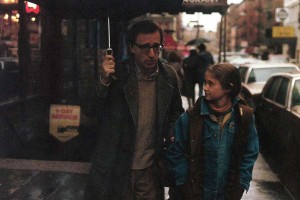 What struck me most forcibly about Crimes and Misdemeanors on first viewing was the way in which Allen portrays his own character’s relationship with his on-screen niece, a child who is dressed in the style of an adult and whom his character treats as an adult, to the point of making confessions to her about his love life that are—to put it very, very mildly—inappropriate. It would be an understatement to say that I didn’t find these scenes any more palatable in Waco. In fact, I went so far as to refer to the film as “an esoteric confession” in the post-screening discussion, a statement that no one in the room, not even Allen’s avowed admirers, made haste to criticize.
What struck me most forcibly about Crimes and Misdemeanors on first viewing was the way in which Allen portrays his own character’s relationship with his on-screen niece, a child who is dressed in the style of an adult and whom his character treats as an adult, to the point of making confessions to her about his love life that are—to put it very, very mildly—inappropriate. It would be an understatement to say that I didn’t find these scenes any more palatable in Waco. In fact, I went so far as to refer to the film as “an esoteric confession” in the post-screening discussion, a statement that no one in the room, not even Allen’s avowed admirers, made haste to criticize.
That said, I paid more attention the second time around to the main plot line of Crimes and Misdemeanors, whose protagonist is a well-to-do New York ophthalmologist (brilliantly played by Martin Landau) who has his mistress murdered when she threatens to break up his marriage by revealing their affair to his wife. The point of the film is that Landau’s character gets away with it, which proves to him that there is no God and that human life thus has no meaning beyond that with which human beings endow it by their freely chosen actions. Yes, it’s more complicated than that, but not much more, and while Allen portrays Landau’s moral struggles en route to this conclusion with impressive cinematic skill, the film’s jejune denouement put me in mind of a bright teenager who has just looked up the word “nihilism” in the encyclopedia and is eager to use it in a sentence.
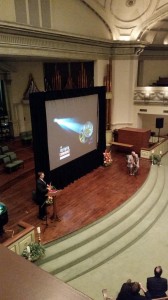 In the evening I saw Horton Foote’s Tender Mercies, which was shot not far from Waco in 1982 and was shown on Saturday at the First Baptist Church, an edifice at once grandiose and homey which was built in 1906 and whose sanctuary, where we saw the film, is big enough to seat three thousand people. After the screening, Bruce Beresford, the director, took questions from the audience, in the process proving himself to be both charming and (as befits an Aussie) thoroughly down to earth.
In the evening I saw Horton Foote’s Tender Mercies, which was shot not far from Waco in 1982 and was shown on Saturday at the First Baptist Church, an edifice at once grandiose and homey which was built in 1906 and whose sanctuary, where we saw the film, is big enough to seat three thousand people. After the screening, Bruce Beresford, the director, took questions from the audience, in the process proving himself to be both charming and (as befits an Aussie) thoroughly down to earth.
Tender Mercies is one of Foote’s supreme creative achievements, one of only two movies that I know—the other is Kenneth Lonergan’s You Can Count on Me—that portray American small-town life with perfect honesty and complete sympathy. No small part of its excellence inheres in the way that he shows us the importance of the part played by religion in the daily lives of his three principal characters. This matters all the more because the subject of Tender Mercies is the regenerative power of love. Mac Sledge (played no less brilliantly by Robert Duvall) is a down-and-out country singer whose marriage and career have been destroyed by alcohol. He makes his way to a motel in rural Texas that is owned by Rosa Lee, a young widow whom he marries and whose steadfast love inspires him to stop drinking, accept his diminished lot, be baptized, and devote himself wholly to his new wife and her son.
Mac’s resolve is tested severely when he learns that his daughter, whom he has seen only once in the lean years since his divorce, has died in a car crash. After he returns from her funeral in Nashville, he makes the following speech to Rosa Lee:
I was almost killed once in a car accident. I was drunk and I ran off the side of the road and I turned over four times. They took me out of that car for dead, but I lived. And I prayed last night to know why I lived and she died, but I got no answer to my prayers. I still don’t know why she died and I lived. I don’t know the answer to nothing. Not a blessed thing. I don’t know why I wandered out to this part of Texas drunk and you took me in and pitied me and helped me to straighten out and married me. Why, why did this happen? Is there a reason that happened? And Sonny’s daddy died in the war. My daughter killed in an automobile accident. Why? You see, I don’t trust happiness. I never did, I never will.
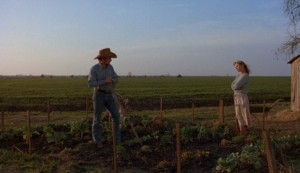 This is a beautiful and powerful speech, especially as delivered by Duvall, but when parsed it hints rather more than casually at a view of the world not far removed from that of Crimes and Misdemeanors, which is that life is pandemonium. And the only “answer” given by Foote to Mac’s anguished question comes in the next and final scene, in which we watch him playing catch with his stepson while the boy’s mother looks on. Here again Foote appears to be in close concord with Allen in suggesting that the sole meaning of life accessible to human beings is that with which they themselves endow it by choosing to cleave to one another. Yet the denouement of Tender Mercies, unlike that of Crimes and Misdemeanors, is the furthest thing from jejune.
This is a beautiful and powerful speech, especially as delivered by Duvall, but when parsed it hints rather more than casually at a view of the world not far removed from that of Crimes and Misdemeanors, which is that life is pandemonium. And the only “answer” given by Foote to Mac’s anguished question comes in the next and final scene, in which we watch him playing catch with his stepson while the boy’s mother looks on. Here again Foote appears to be in close concord with Allen in suggesting that the sole meaning of life accessible to human beings is that with which they themselves endow it by choosing to cleave to one another. Yet the denouement of Tender Mercies, unlike that of Crimes and Misdemeanors, is the furthest thing from jejune.
Why is this so? My own feeling, for what it’s worth, is that Crimes and Misdemeanors is too reductively explicit to support the weight of its parable-like moralizing, whereas Foote is content to let the viewer come to his own conclusions about the ambiguous last scene of Tender Mercies, which makes no assertions of any kind. Not so Allen’s film, whose last scene leaves us in no possible doubt (save in the minds of interpretation-happy academics) of what he takes to be its precise meaning, which he has since spelled out to interviewers on numerous occasions.
Whatever the reason, I found it both fascinating and profitable, not to mention enjoyable, to watch Crimes and Misdemeanors and Tender Mercies in a single day. I doubt I’ll ever bother to see Allen’s film again, though. I got it the first time, and it isn’t artful enough to repay repeated viewing. On the other hand, I’m sure I’ve seen Tender Mercies at least a half-dozen times, and I expect I’ll see it a half-dozen more times between now and…well, whatever. Unlike Crimes and Misdemeanors, Tender Mercies is a great work of art, which means, among other things, that it lets you make up your own mind about what it means. That’s one of the reasons why it can be seen with profit again and again: you may not come up with the same answer next time.
* * *
The final scene of Crimes and Misdemeanors:
A scene from Tender Mercies:
In today’s Wall Street Journal I report on two new plays, Billy & Ray and Disgraced. Here’s an excerpt.
* * *
Raymond Chandler and Billy Wilder wrote the screenplay for “Double Indemnity” together in 1943, then spent the rest of their lives griping about one another. Chandler found Wilder’s breezy, bossy, self-assured manner so grating that he briefly quit the picture, later claiming that working with the younger man “was an agonizing experience and has probably shortened my life.” As for Wilder, he was equally exasperated by Chandler’s touch-me-not gentility, and since he outlived his co-author by four decades, he got the last word: “Apparently he had resigned because, while we were sitting in the office with the sun shining through, I had asked him to close the curtains and I had not said please.”
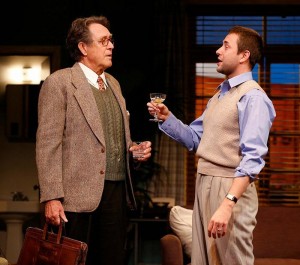 Now Mike Bencivenga has transformed their edgy but productive collaboration into an Off-Broadway play called “Billy & Ray,” and he’s persuaded Garry Marshall, who is best known for such big- and small-screen projects as “Pretty Woman” and “Laverne and Shirley,” to direct. It’s a neat idea on paper, but Mr. Bencivenga has come up with a glib, sitcom-flavored show that works well enough on stage—much of the second act is actually quite involving—but will still strike those who already know how “Double Indemnity” got written as something of a lost opportunity….
Now Mike Bencivenga has transformed their edgy but productive collaboration into an Off-Broadway play called “Billy & Ray,” and he’s persuaded Garry Marshall, who is best known for such big- and small-screen projects as “Pretty Woman” and “Laverne and Shirley,” to direct. It’s a neat idea on paper, but Mr. Bencivenga has come up with a glib, sitcom-flavored show that works well enough on stage—much of the second act is actually quite involving—but will still strike those who already know how “Double Indemnity” got written as something of a lost opportunity….
Ayad Akhtar’s “Disgraced,” which won last year’s Pulitzer Prize for drama, has arrived on Broadway after successful runs in Chicago and at Lincoln Center Theatre. It’s about Amir (Hari Dhillon), a deracinated Pakistani émigré who renounces Islam as “a backward way of thinking,” moves to New York, marries a white painter with an acutely inflamed case of liberal guilt (Gretchen Mol) and becomes a hotshot litigator at a Jewish law firm, at which point he suddenly realizes that his Muslim roots go far deeper than his wife and colleagues ever suspected.
This is a genuinely provocative premise for an issue-driven play, and Mr. Akhtar deserves much credit for grappling honestly and forthrightly with what in other hands could easily have become a mealy-mouthed exercise in can’t-we-all-get-along difference-splitting. Unfortunately, his dramaturgy isn’t as impressive as his nerve. Not only do his characters spend far too much of the evening making speeches to one another, but every “surprise” is telegraphed so far in advance of its eventual arrival that you find yourself getting actively impatient for the reveals….
* * *
To read my review of Billy & Ray, go here.
To read my review of Disgraced, go here.
My favorite speech from Billy Wilder’s 1944 film version of James M. Cain’s Double Indemnity, featuring Edward G. Robinson:
In today’s Wall Street Journal “Sightings” column I consider how the shift from bookstore to online book buying is changing American culture. Here’s an excerpt.
* * *
On a recent trip to Chicago, I spent an hour wandering through the Seminary Co-Op, the University of Chicago’s much-loved independent bookstore, which claims to have more than 100,000 titles in stock at any given moment. I bought three books during my visit. One of them, Stephen Parker’s “Bertolt Brecht: A Literary Life,” had been on my literary radar screen since August, when I read the Times Literary Supplement’s review. Not so the others, Todd Decker’s “Music Makes Me: Fred Astaire and Jazz,” which came out in 2011, and “Benny Goodman’s Famous 1938 Carnegie Hall Jazz Concert,” a monograph by Catherine Tackley that was published two years ago. I make a point of keeping up with new books about film, dance and jazz, but somehow I hadn’t heard of either one.
 What’s the point of this anecdote? Just this: It was solely because I visited the Seminary Co-Op that I bought those two books. Yet it had been at least two years, if not more, since I’d set foot in a large brick-and-mortar bookstore. Nor can I remember the last time that I went into a record store of any size. Like a fast-growing number of Americans, I now do virtually all of my book and record buying online. It’s cheaper and infinitely more convenient to click a few keys and be done with it.
What’s the point of this anecdote? Just this: It was solely because I visited the Seminary Co-Op that I bought those two books. Yet it had been at least two years, if not more, since I’d set foot in a large brick-and-mortar bookstore. Nor can I remember the last time that I went into a record store of any size. Like a fast-growing number of Americans, I now do virtually all of my book and record buying online. It’s cheaper and infinitely more convenient to click a few keys and be done with it.
That’s the good part. Here’s the bad part: Nowadays I buy a book or record only because I’m specifically looking for it. But when I went to the Seminary Co-Op, I browsed purely for the sake of browsing, and in so doing made two happy discoveries. Had I not stumbled across “Music Makes Me” and “Benny Goodman’s Famous 1938 Carnegie Hall Jazz Concert” purely by chance, I doubt I would ever have learned of their existence, much less bought and read them.
In 2006 I noted in this space that online stores like Amazon were “seeking to replace the personal touch…with ‘preference engines’ that automatically generate computerized lists of ‘other items you might enjoy’ each time you make a purchase.” Eight years later, I can report that these marketing tools haven’t made the slightest bit of difference in my own life. So far as I can recall, I’ve never bought an “other item you might enjoy” from Amazon, not even once.
For me, then, preference engines have not replaced browsing. But neither has anything else. As a result, I no longer browse. What’s more, I suspect that my experience is widely shared. Browsing, it appears, will soon be as dead as dial phones. That constitutes a huge cultural shift, one whose unintended consequences are not yet clear. Still, I’m sure that they’re going to be significant, and if I had to guess, I’d say they’ll be harmful….
* * *
Read the whole thing here.
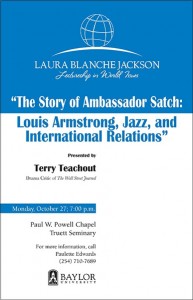 If you live in or near Waco, Texas, a city of which I am greatly fond, you might want to know that I’ll be giving a pair of lectures this coming weekend at Baylor University, an institution of which I’m no less fond.
If you live in or near Waco, Texas, a city of which I am greatly fond, you might want to know that I’ll be giving a pair of lectures this coming weekend at Baylor University, an institution of which I’m no less fond.
On Saturday I’ll be talking about Whit Stillman’s movies at a conference called “Faith and Film,” and on Monday I’ll be delivering Baylor’s Laura Blanche Jackson Endowed Memorial Lectureship in World Issues. I don’t usually give speeches about foreign policy, but it happens that this particular lecture, “The Story of Ambassador Satch: Louis Armstrong, Jazz, and International Relations,” deals with a subject about which I think it would be fair to say that I do know a little something.
Alas, the Stillman lecture is part of a symposium that is now booked solid, but my Armstrong lecture is open to the public. It will begin at seven p.m. at Baylor’s Paul W. Powell Chapel. For more information, go here.
| M | T | W | T | F | S | S |
|---|---|---|---|---|---|---|
| 1 | 2 | |||||
| 3 | 4 | 5 | 6 | 7 | 8 | 9 |
| 10 | 11 | 12 | 13 | 14 | 15 | 16 |
| 17 | 18 | 19 | 20 | 21 | 22 | 23 |
| 24 | 25 | 26 | 27 | 28 | ||
An ArtsJournal Blog